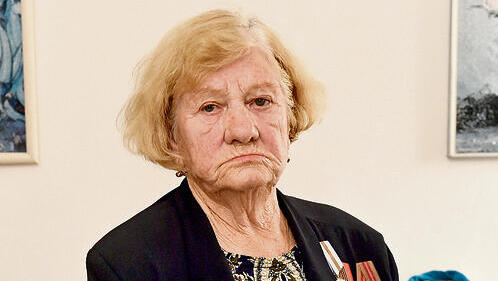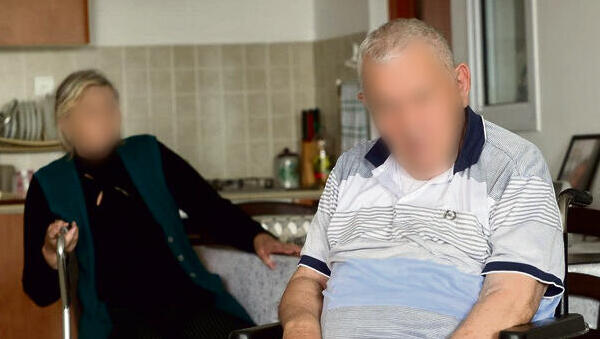They survived World War II, living through terror, hunger and fear, losing many family members. In the shadow of the incomprehensible trauma of the Holocaust, they made their way to Israel. Here, they planted their family tree, worked and hoped to live peaceful and prosperous lives in their old age. But for too many of them, the reality is different.
Thousands of Holocaust survivors in Israel live around the poverty line. Others struggle under bureaucracy and don't receive what they are entitled to. Some grapple with loneliness and lack basic necessities, made worse by the recent months of war.
"I think we need to help Holocaust survivors and the elderly community more," says Holocaust survivor Esther Gandlin, 83. "These are our last years, and I would like to live them in a more dignified manner. We're used to living in difficulty, and if we received more help we would be grateful."
Gandlin was born in the shadow of World War II in the town of Parez in Belarus, from where her family had to flee following Nazi bombings. "We took nothing with us, only documents," she recalls. The building where Esther lives with her husband has been slated for demolition for 13 years. "The house is in very bad condition," she says.
"The building is old, the sewage is failing, and the apartment itself hasn't undergone any renovation for years," she explains. Esther's additional struggles in the past half-year include the current war. "I'm desperate about the situation, especially after what happened on October 7," she says. "The difficulty and frustration of going through antisemitic incidents again make it very hard for me. It affects both my physical and mental health."
In recent years, some steps have been taken to improve benefits and conditions for Holocaust survivors, but they fall short of the needs on the ground. Many survivors receive only a one-time grant and must subsist on an unchanged pension for two decades, while the cost of living continues to soar.
For Holocaust survivor Vera Tomnov, 93, the main difficulty lies in mobility outside her home. "I have difficulty with my vision," she explains. "In one eye, I only have 70% vision, in the other, 50%. Despite her condition, Vera isn't entitled to a caregiver. "I have a wonderful son, and he and his wife help as much as they can. I appreciate it, but they can't be with me all the time when I need them. There was a time when I paid for a private caregiver, but it was tough for me financially. Most of the day I'm confined to my home; if I go out, it's only to see doctors and buy medications."
As Holocaust Remembrance Day approaches next week, the Foundation for the Welfare of Holocaust Victims published on Thursday morning the results of the 2024 survey on the needs of Holocaust survivors. According to the foundation's data, 36% of Holocaust survivors need assistance in purchasing household groceries beyond the aid they currently receive. Some 27% had to forego food due to financial difficulties or mobility issues. For half (51%) of Holocaust survivors, covering monthly household expenses is difficult.
Some 24.3% of Holocaust survivors had to forego medical tests or treatments, 20.1% had to forego medical aids or accessibility devices, and 7.6% had to forego medications. Another 12% have no access to all rooms in their homes.
At least 35.8% of Holocaust survivors live entirely alone. Some 50% wish to leave the house more but are unable to and 41% indicated feeling lonely to some extent or greatly.
Some 61% of Holocaust survivors reported a decrease in quality of life due to the war, with the main factor being psychological. Close to a fifth (18%) are not adapted at all; the main reason for this (46%) is lack of secure space in their surroundings, followed by accessibility issues (30%).
"The survey data teach us a lot about the situation of Holocaust survivors; these are worrying figures," says Limor Livnat, chairman of The Foundation for the Welfare of Holocaust Victims. "Holocaust survivors are a disappearing generation. They, who have endured the worst, deserve a better present and future from us as an Israeli society." About 30,000 Holocaust survivors live on income supplements and are therefore defined as living in poverty, she said.
"In phone conversations we've had with survivors since the beginning of the war, many cases of post-traumatic awakening have emerged," says Ety Farhi, CEO of The Foundation for the Welfare of Holocaust Victims. "For some of them, October 7 was horrors that brought them back to the trauma of the Holocaust. In parallel and distinct, we encountered immense resilience among some Holocaust survivors. It's imperative not to address Holocaust survivors only in the context of hunger and poverty. However, the needs survey proves that the range of needs they have is broad and diverse, encompassing assistance in various areas. It's up to all of us to mobilize before it's too late."
For Holocaust survivor Moshe and his wife, Miriam, the main challenge is bureaucracy. "My wife Miriam is my backbone," says Moshe. "We've been married for 24 years, and over the years she took care of me. But she underwent surgery, and now she also has health issues. I'm in a wheelchair, and we need a caregiver to be with us. Before my wife underwent surgery, she did everything."
For 16 years, Miriam, 70, worked as a caregiver. "A lot of bureaucracy needs to be solved to change that," she explains. "I feel like I've been thrown into the sea. I worked for 25 years, paid everything, and in the end, I got nothing."




